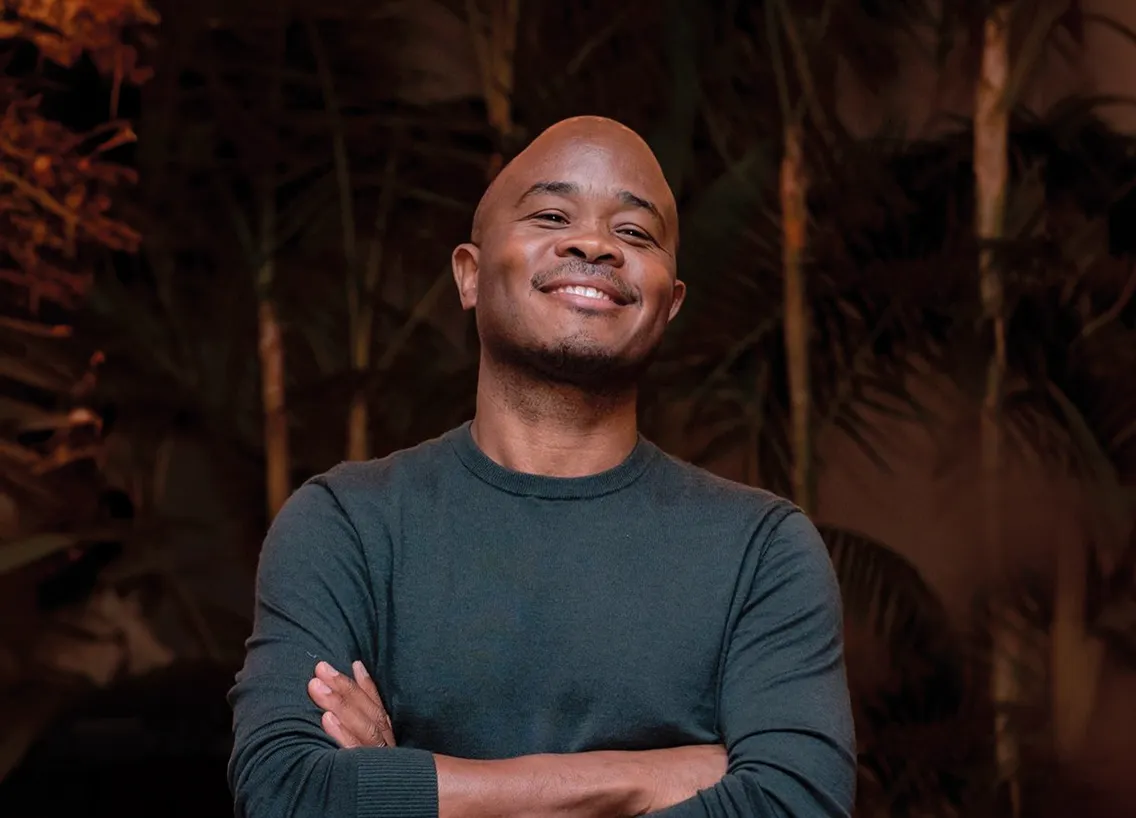
I’d known Fred Swaniker for over a decade when he first invited our group to join the African Leadership Network, a retreat for young Africans from across the continent to share, learn, connect and create the links and networks to help grow transformative businesses and ventures throughout Africa. This time we met on a rainy Sunday morning in New York following a gruelling week at the UN General Assembly, a maelstrom of events, gatherings, dinners, and meetings.
We decided to go for a walk in Central Park, near the Upper West side and not far from where Swaniker now resides, having relocated from Nairobi to be close to his clients and to help grow his latest business, Sand Technologies, the eighth venture he has launched in the last twenty years: “95% of our revenues today come from outside of Africa. I wanted to be closer to our customers, so I could grow the company and create more jobs in Africa. This is similar to how Indian talent builds tech for the world,” he explains.
Sitting down with Swaniker is always enlightening. The Ghanaian-born serial entrepreneur’s enthusiasm and passion remain on full display. His next moonshot: to train an army of software engineers – three to five million over the next ten years, through Sand Technologies’ ALX company. “We expect to reach five million in the next decade,” he assures me. “And we’re not just talking. We’re training 250,000 people right now across Africa to become software engineers, data scientists, cloud engineers and so on.”
Africa’s youth bulge is at once an opportunity and a risk. With so many young people, the continent has the most vibrant source of workers and consumers going into the future. And yet, without a matching supply of jobs and livelihoods, it could easily become a trigger for social discord and unrest.
“I’m very bullish on the talent, but I’m not bullish on the demographic dividend and the way things are going. We need to do a massive talent export strategy. We need to export 100m people from Africa. However, exporting our talent does not necessarily mean brain drain.”
Talent export: three paths forward
Swaniker sees talent export happening in one of three ways. First, talent can sit in Africa and work remotely for companies in richer economies. According to research from Swaniker’s African Leadership Group’s (ALG), a university graduate working in Africa for a local company earns an average of $200 per month. “That’s absolutely undervaluing our human capital,” he says. “Some of the graduates from ALG now sit in Africa but earn up to $5,000, working remotely for a company in say, Australia.” This is money that can be re-invested and spent in the local economy.
“That’s the best [form of export] because it creates wealth on the continent,” Swaniker argues.
“We have an AI Career Essentials course, where we train young people to use AI tools so that they can serve, for example, as a virtual assistant for someone in another country. I met one woman in Kigali who said she was a graduate from the course and is now working for a company in the United States and earning $2,000 a month!”
Swaniker claims that, thanks to technology and their unique training methods, his courses cost a fraction of what a standard degree would cost on the continent. “That is how you create a middle class with a capital-light strategy. We don’t need to deploy billions to set up a mine or a telecoms company. We train you for $200 or less and you are good to go.”
The second approach for talent exports, he explains, is to attract global corporate giants to come and set up in Africa, drawn by the large talent pool companies like his are helping to groom.
“In India, there are about 7.5m people who work in the tech sector but about 1.5m of them don’t work for local Indian companies. They are working for the Google office in India or Microsoft’s office there.”
That is a challenge that animates him. “How do you make Africa the next centre of the tech world? That’s what I want to do,” he declares.
With advantages such as language and time zones that are friendlier to the centres of finance and technology, Africa’s potential is enormous, Swaniker insists. “If you look at India, only 12% of the people speak English; even less in China. In Africa, 60% of people speak English or French,” he points out.
The only difference, he says, is that India educated its people at large scale, while African countries have failed to do so. “About 40% of people in India have post-secondary education. In Africa it’s only 8%.”
Swaniker notes that the third and most traditional approach to “talent export” is Africans physically moving to other parts of the world. This need not be deleterious to the continent’s own development.
“Brain drain only occurs if you are producing talent at low scale. If you only graduate 600 doctors a year and 300 leave, you have a problem. But if you produce 10,000 doctors and 1,000 leave, you still have 9,000 left to serve local needs. This is what India did. They trained 45m engineers over three decades. Perhaps one million left and went to the US. Today they run Google and Microsoft. But the rest remained in India and built Tata Consultancy Services, Infosys, and other local tech giants who now serve the world from India.”
For receiving countries, they get the manpower needed to keep their industries and societies going, while Africa would also benefit from the remittances that its migrating workers send back home. The United Nations estimates that in the decade to 2022 remittances sent home by Africans living and working in the West doubled, reaching $100bn.
“I think it’s Africa’s greatest export. The only thing we can beat China in is our people. It’s the one thing we have that no one else has. We are very good at producing people,” he observes.
For talent exports to work, however, Africans must be skilled. Recent evidence attests to how unwelcome unskilled Africans are in the parts of the world where they might want to seek a living. The dynamic is however different for those who have skills that make them useful or even indispensable in their host countries.
A school for the leaders of the future
This is a flag that Swaniker has been flying, in some shape or form, for some time. After getting his start at McKinsey & Company in Johannesburg, he went to Stanford Graduate School of Business in California, where he earned an MBA and was honoured as an Arjay Miller Scholar, a distinction reserved for the top 10% of each graduating class.
It was here that he co-founded African Leadership Academy, with his colleague Chris Bradford. Their business plan for ALA aimed to create a pan-African institution dedicated to grooming future leaders of the continent. Leveraging his connections in Silicon Valley, Swaniker secured financial support and in 2004, soon after graduating, the academy became a reality.
Since its inception, the African Leadership Academy has enrolled 1,588 young people from 46 different African countries in its flagship two-year programme; 97% of these are on some form of scholarship. Notably, 78% of ALA graduates are actively engaged in work or projects across Africa, contributing to the region’s growth and development. At least one of its graduates is in the Kenyan Senate; others sit in legislative bodies around the continent, Swaniker notes, exemplifying the aspiration that its graduates would go on to put their shoulders to the wheels of change on the continent.
Swaniker’s belief in the importance of good leadership has remained steadfast even as he has scaled his work to training more than 250,000 people in technology skills.
“We created this tech training programme, in which we fuse leadership training with the tech. So they do six months of leadership training before they learn software engineering and data science. We didn’t want them building technology without values because AI can be dangerous if it is not paired with ethics and values,” he says.
For Swaniker, AI and tech in general must solve problems, especially in Africa.
“As we build AI, we mustn’t do tech for tech’s sake. That’s how Silicon Valley lost its way,” he muses. For the trainees from ALU, ALA and ALX, the focus is on how tech and AI can address the continent’s challenges, from health, education to agriculture.
The ALU – a fully-residential programme with campuses in Rwanda and Mauritius – has 2,500 students, which is 10 times bigger than ALA. But it turned out to be capital-intensive, and a residential model involving travel turned out to be unaffordable for most African families. To be able to make an impact on the scale that Swaniker clearly wants, it was necessary to have another model.
The ALX programme, created in response to the need to avoid travel and housing costs, is a decentralised programme with hubs around the continent through which young people, like the Rwandan working virtually for a US company, gain the skills they need to earn a living that would otherwise not be possible.
“It’s working and scaling. We have 250,000 now and in the next 10 years we are going to take it to five million,” he says.
Low-key donors step up to the plate
The programmes are supported by philanthropic donations. Despite its good intentions, Swaniker says it was difficult to get high net-worth Africans to support it.
“I went to many of the African billionaires you read about. In the end, I did get some money from wealthy Nigerians, South Africans, and Kenyans, but not from the more famous ones. Those who supported are the more low-profile African philanthropists. But I didn’t let it stop me. I said I’d take the money from wherever it comes.”
The MasterCard Foundation has become one of the dependable partners that the group relies on. “They have been with us for about 14 years and without their unrelenting support, we wouldn’t have scaled this massively,” he reveals.
Not that he has been unsuccessful in finding finance. In the last 20 years Swaniker has raised some $1.5bn to fund ALGroup. The latest part of the group is Sand Technologies, the data and artificial intelligence firm that he founded recently. With over 400 employees and an expanding footprint across Europe and Africa, Sand Technologies offers enterprise AI, data science, and digital twin solutions to blue-chip companies and public sector organisations – what he calls industrial AI. For example, their AI systems help manage the water supply of London.
They also work with large telecommunication companies to help them optimise where to roll out optical fibre and cell phone towers, and to advise them how to manage their cell phone networks to enhance customer experience.
A learning experience
As an educator, it is no surprise that managing these businesses has also been a learning experience for Swaniker. “One of the things I’ve learnt,” he shares, “is that if you want something to get big, you have to give it away; you have to build institutions and teams”.
Currently, he says, Sand Technologies is the only one of his eight companies that he runs on a day-to-day basis. The rest are run by the leadership teams that he has picked and groomed.
“It took me a while, because I listened to people who wanted me to get experienced people from outside of Africa to run our operations in Africa. When I started hiring and promoting my African talent, everything went much smoother. We decentralised, empowered the teams, and now we move at 200 km an hour!”
Every four months the team gets together for in-person meetings to review the previous quarter and plan for the next one. Every week, Swaniker holds online “all-hands” meetings with his whole company, and once a month “business reviews” with his leadership teams.
And every Monday he sends out a letter to his team. “I’ve learnt that when you are leading at scale, one of the things you have to do is reinforce clarity and that is what I try to do in my letters – to overcommunicate clarity.”
Offering further insight into his leadership style, Swaniker references Patrick M. Lencioni’s The Advantage: why organisational health trumps everything else in business.
The central thesis of the book is that creating a healthy organisation is fundamentally different from merely building a high-performing one: it must not only excel in performance but also be free of politics, foster an environment in which employees are inspired, and encourage them to bring their best selves to work.
Swaniker is a relatively young man, but is already looking round the bend to ensure that the vision he has for Africa abides for the long term. His plan is for Sand Technologies, in which he currently holds 55% ownership, to continue to support his vision even when he is no longer around.
“We have a massive pipeline for succession. I really care about building institutions that live beyond me as the founder.
“If I was hit by a bus tomorrow, this thing would continue because I’ve built an army of leaders who understand the vision and can carry it on.”








Comments